The death of Napoleon's Great Army on the Berezina
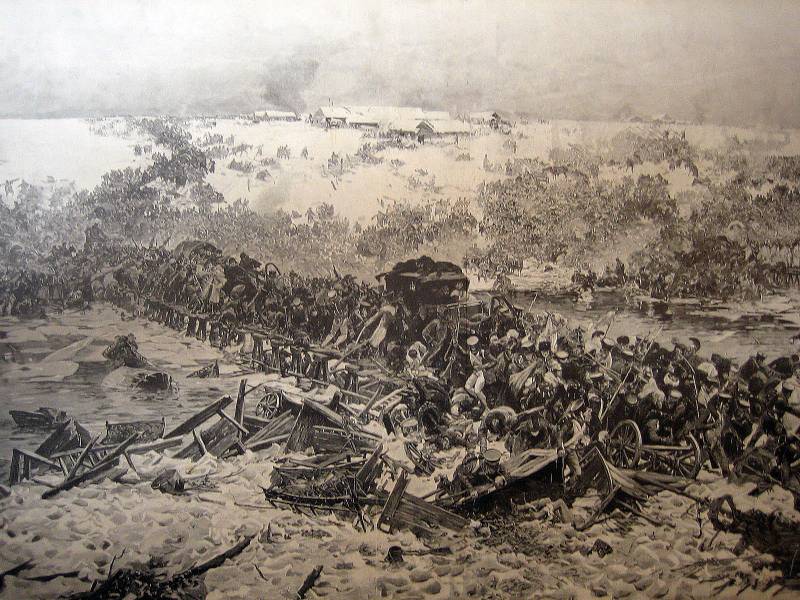
Y. Falat. Bridge over the Berezina. 1890
General situation
After the battle of Red (The heavy defeat of Napoleon's army near Krasnoe) the French were pursued by Miloradovich's vanguard, Platov's Cossacks, Ozharovsky's detachment and other commanders. The main forces of the French army could go to Lithuania or move to Volhynia, to join the Austrian-Saxon group of Schwarzenberg. Napoleon's movement to the north, to connect with the troops of Marshal Victor, was considered unlikely. Wittgenstein was instructed to increase pressure on the northern wing of the enemy. It was planned to reinforce it with Platov's Cossacks and a detachment of Adjutant General Kutuzov.
Kutuzov also ordered Admiral Chichagov to speed up the movement to the Berezina in order to forestall the main forces of Bonaparte and occupy Borisov. The main headquarters believed that Chichagov's army had already been reinforced by the formations of Leaders and Ertel and had grown to 60 thousand soldiers. With such forces, Chichagov could stop Napoleon's army, which was almost without cavalry and artillery. That is, the troops of Chichagov had to take the blow on themselves, at that time the troops of Wittgenstein and Kutuzov went to the flanks and rear of the enemy.
On November 8–10, 1812, intelligence reported that the enemy was moving from Orsha along the high road to Borisov. That is, the plan of the operation took on a final character: with the troops of Wittgenstein from the north and Chichagov from the south, take a defensive position on the line of the Ulla and Berezina rivers with the front to the east, cutting off the enemy's escape route to the west. The main army delivered the final blow to the enemy from the east.
One of the problems of the main army was the issue of supply. As it moved west, the army received less and less food. Our troops even had to use captured enemy stores to supply them. So, the detachment of Ozharovsky captured the food base of the French in Mogilev. Before the occupation of Mogilev, Russian troops defeated an enemy detachment near the town of Gorki, the French lost more than 2 thousand people. Then Ozharovsky's detachment defeated the enemy garrison in Shklov.
No less difficult was the situation with winter uniforms. The bulk of the soldiers were still in summer uniforms. The result was deplorable: every day a significant number of sick soldiers left the army, with whom the mobile hospitals that were moving behind and established in the rear were clogged. Losses of frostbitten and sick were higher than combat losses and amounted to 30 thousand people. After the battle of Krasnoye, no more than 50 thousand soldiers remained in Kutuzov's army.
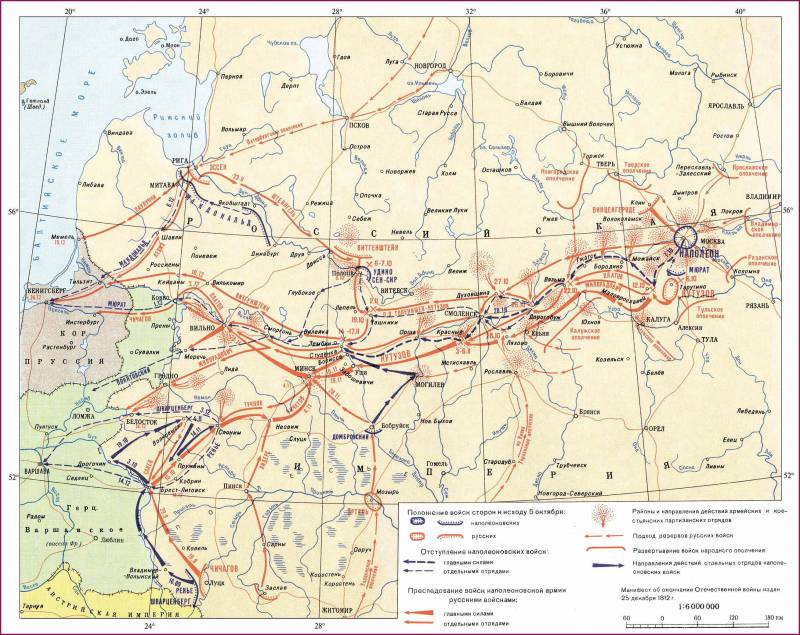
On the flanks
Chichagov, with the help of Lambert's vanguard, liberated Minsk with a quick blow on November 4 (16), where there were large food supplies of the French army (about 2 million rations). Also, more than 4 thousand enemy soldiers were captured in the city and its environs, mostly the wounded and sick. On November 9 (21), Lambert's vanguard in a fierce battle defeated the enemy garrison and occupied the crossing near Borisov ("The battle is cruel and bloody" at Borisov).
Defeated near Borisov, the French troops under the command of Dombrovsky retreated towards Napoleon's army. The main forces of Chichagov established themselves in the Borisov position. At the same time, detachments of Chaplits and Lukovkin arrived. Chaplits went to Zembin, and Lukovkin to the Shabashevichs. Chichagov began to transport troops to the left bank of the Berezina. At the same time, instead of first transferring the cavalry and infantry, the admiral began to transfer artillery and carts, although it was already known that the enemy should be expected in 2-3 days.
Chichagov also received a message from Wittgenstein that his troops were pushing back units of Oudinot and Victor, who, in his opinion, were withdrawing south through Loshnitsy to the Lower Berezino. Chichagov sent a 3-strong vanguard under the command of Palen to Loshnitsy, who was supposed to establish contact with Wittgenstein's army. Palen's detachment, moving along the Smolensk road without proper security measures, at Loshnitsy ran into the 10th vanguard of Napoleon's army under the command of Oudinot. The road along which the Palen detachment was moving passed through a dense forest, which excluded the possibility of deploying troops. Directly at Loshnitsy, the road left the forest and passed through a small copse.
Oudinot, having received information about the movement of Russian troops, deployed his corps in this very copse. Across the road, he placed artillery with infantry, in the second line - cavalry. When the Russian troops left the forest, they were met by enemy cavalry fire. Our troops could not turn around, put forward guns. The French marshal threw his troops into the attack. Russian troops were overturned and retreated to Borisov.
The French appeared at Borisov almost simultaneously with the retreating Russians. This came as a surprise to Chichagov. The admiral decided that these were already the main forces of Napoleon, overestimated the enemy forces (he thought that the emperor had at least 90 thousand soldiers) and did not dare to join the battle. Although he had the opportunity to delay the vanguard of the enemy with cash forces, while his main forces were crossing the river. Chichagov ordered to leave Borisov, abandon the transported carts and blow up the bridge. On November 12 (24), about 25 Chichagov soldiers occupied the right bank of the Berezina from Zembin to Usha. Russian troops were dispersed to keep an eye on the enemy. The capture of Borisov allowed the French to choose a place for the crossing.
Wittgenstein acted no better than Chichagov. At first, he hesitated, believing that Napoleon was going to join the corps of Victor and Oudinot. When it became known that the northern corps of the enemy had left, Wittgenstein began the pursuit, but carefully and slowly.
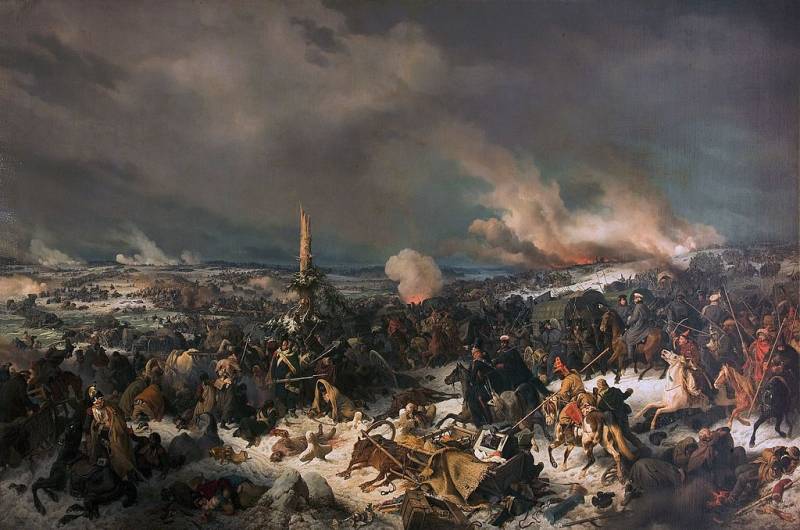
Peter von Hess. Crossing the Berezina (1844)
French people
The French command after the defeat near Krasnoe had to solve two main tasks. First, make every effort to save the main personnel of the retreating army so that the war can be continued in the future. Secondly, in general, to save the army, which was threatened with encirclement by superior forces of three Russian armies (up to 100 thousand people).
In Orsha, Napoleon reorganized the remnants of Davout's 1st Corps and Ney's 3rd Corps into three battalions each, the 4th Beauharnais Corps and Junot's 8th Corps into two battalions each. The emperor even ordered the banners of all the corps to be collected and burned so that they would not fall into the hands of the enemy. The remains of the artillery were also reorganized. 30 guns from Victor's 9th Corps arrived in Orsha, and in the city itself there was a fleet of 36 guns. Of these, 6 batteries were formed and reinforced with them the corps of Ney, Davout and Beauharnais. The troops received the necessary ammunition and provisions from warehouses in Orsha and Dubrovna. From the miserable remnants of the former brilliant cavalry, a detachment of 500 officers was formed. Napoleon called it "his sacred squadron". These measures increased the combat capability of the army.
With the arrival of the corps of Victor and Oudinot, the size of the army increased to about 75 thousand people. The total number, including the stragglers, unarmed and sick soldiers who trailed behind the corps, was approximately 85-90 thousand people. The combat-ready core of the army was approximately 40 thousand soldiers.
In Orsha, Napoleon learned that Victor's troops could not push the Russians back beyond the Western Dvina. That the Russians entered Minsk. The emperor ordered Oudinot to immediately go to Borisov in order to forestall the enemy. Victor's corps played the role of a flanking northern vanguard to deceive Wittgenstein by showing that the French would retreat north of Borisov. After the withdrawal of the main forces from Orsha, Victor's corps began to play the role of a rearguard.
On November 9 (21), the French left Orsha and destroyed the crossings across the Dnieper. On November 10 (22), they arrived in Tolochin, where it became known that the Russians had occupied Borisov. Napoleon assembled a council of war. It was proposed to turn north, push Wittgenstein beyond the Dvina and go through Glubokoe to Vilna. Jomini believed that it was possible to go to Borisov, cross the Berezina and break through to Vilna. At this time, a report was received by Oudinot about the discovery of a ford near the village of Studenki. This finally determined Napoleon's decision to force the river at Borisov.
The French marched to Borisov for three days. Oudinot was the first to enter the city, followed by the guards. Here the army stood for two days, waiting, reconnaissance was carried out. They feared the approach of Wittgenstein's troops. When it turned out that there was no threat from the north, energetic preparations for the crossing began. To distract Chichagov's attention, they began to prepare a false crossing at the Lower Berezino. A real crossing was prepared near the village of Studenka, 15 km from Borisov upstream of the Berezina.
The deception succeeded, Chichagov, like Wittgenstein, was deceived. The admiral believed that the enemy would break through to Minsk in order to unite with the Austrian corps. Chichagov, contrary to the advice of the chief of staff Sabaneev and the corps commanders, ordered the troops to be concentrated near the Lower Berezino. At Borisov, the Lanzheron corps was left, and at the village of Bryli, the Chaplits detachment. Lanzheron believed that the enemy was trying to restore the crossing in Borisov and ordered Chaplits to leave only an observation detachment at Zembin, and the rest of the forces to go to him.
As a result, the place where the enemy decided to cross was covered by a detachment of General Kornilov consisting of one battalion of rangers and two regiments of Cossacks with 4 guns.
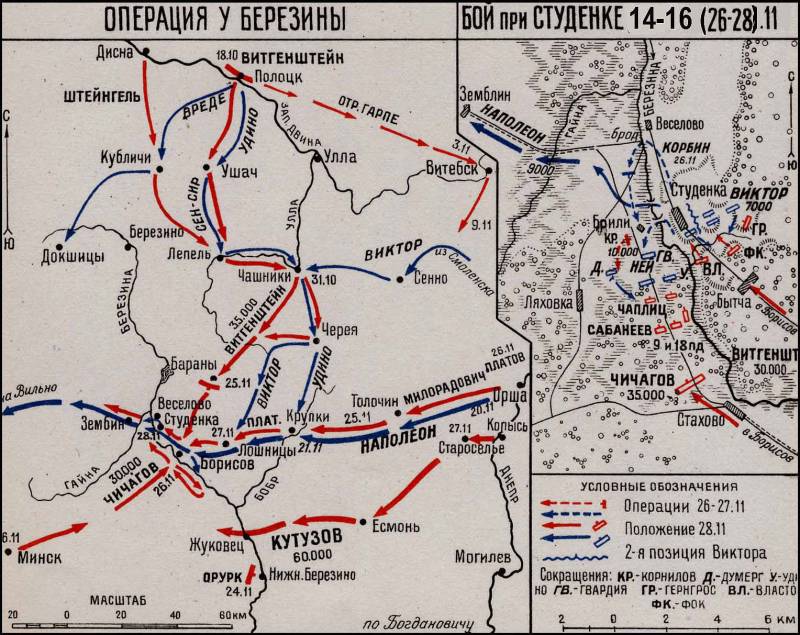
Crossing
On November 14 (26), 1812, the French began to build a crossing near the village of Studenki. Generals J. Eble and F. Chasslu supervised the work. One bridge was intended for infantry, the other for cavalry, artillery and baggage. The sappers had to direct the crossing in icy water. According to eyewitnesses, almost all of them died from the cold. On the same day, the corps commanders received an order to pull the troops to the crossings.
General Kornilov, having discovered the enemy at Studenka, opened fire on them from his guns. He sent Chaplits the news of the preparation of the crossing. Langeron believed that the enemy would not go to Vilna, but to Minsk, so he did not send reinforcements to Kornilov. The Kornilov battery was suppressed by the fire of 40 French guns. Then the Corbino cavalry brigade crossed the river, followed by a battalion from Dombrovsky's division on rafts. The Russians were pushed back from the river.
When the crossings were ready, Dombrovsky's units, Dumerka's cavalry division and Oudinot's 2nd Corps crossed the river. The advanced French forces seized the bridgehead, and seized the Zembinsky defile, where the bridges over the marshes remained intact. If Chaplitz and Lanzheron had destroyed these crossings in time, the French would have lost time. When Chaplits went to the crossing point, he met superior enemy forces, who pushed him back beyond the village of Stakhovo. Langeron sent only two regiments to reinforce, as he was still afraid to leave Borisov.
Meanwhile, Wittgenstein, as before, believed that Napoleon's army would go south of Borisov. Only in the evening of November 14 (26) did the commander of the northern army decide to move forward and establish contact with Chichagov. If Wittgenstein had conducted deeper reconnaissance (there was cavalry for this), then he could have discovered the enemy’s crossing point and taken Studenki. His army numbered 35-40 thousand soldiers, which made it possible to repel the first attacks of the enemy and wait for the approach of the troops of Chichagov and Kutuzov. However, the general, like Admiral Chichagov, overestimated the strength of the enemy. He behaved very carefully, not wanting to take the blow of Napoleon's army on himself.
Chichagov, realizing that the crossing at the Lower Berezino was false, led the troops back to Borisov. On November 15 (27), having traveled more than 30 versts in a day, the southern army again reached Borisov. The troops were exhausted by the march, and they had to rest, only part of the cavalry was sent to Studenka.
Therefore, on November 15 (27), the French crossed the river quite calmly. The river was crossed by the guards, the 1st and 4th corps of Davout and Beauharnais. There were already up to 15 thousand soldiers on the right-bank bridgehead. Oudinot's troops defended the crossing, Victor's corps was in Borisov. At night, stragglers began to arrive, crowds of abandoned weapon, sick and wounded soldiers, civilians with convoys. Bonaparte ordered that only "walking in the ranks" groups be allowed through, crowds and wagons were not allowed through. A mess has begun.
Wittgenstein only at the end of the day on November 15 (27) decided to advance advanced forces to Old Borisov, and with the main forces to go to New Borisov. The vanguard under the command of Vlastov, having reached the edge of the forest through which the road from Stary Borisov to Studenka ran, discovered the enemy and attacked. It was the division of General Partuno, which had the task of holding Borisov until the crossing was completed. But Partuno left the city earlier due to the appearance of the forces of Platov and Yermolov. There were about 7 thousand people under the command of the French general.
Partuno counterattacked the Russian troops at dusk, but was repulsed with heavy losses. Seeing that he was surrounded, Partuno sent an officer to Wittgenstein to negotiate a surrender. He himself, with part of the division, tried to go through the forest to the crossing, but was unsuccessful and was taken prisoner. On the morning of November 16, the rest of the French laid down their arms. Only now Wittgenstein realized his mistake and decided to attack the enemy.
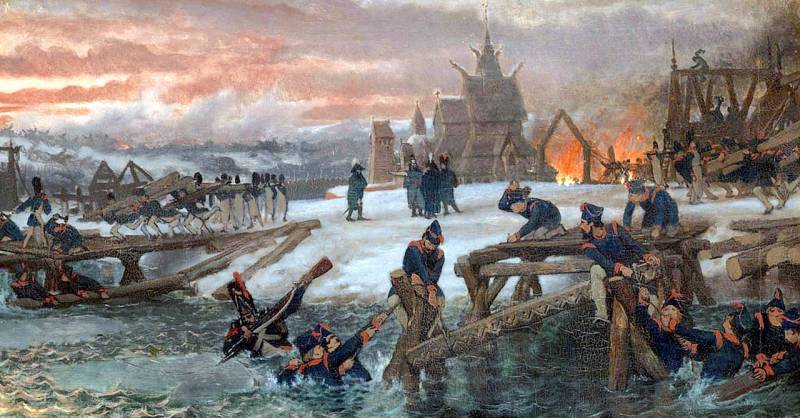
Guidance of pontoons by the French across the Berezina. Hood. Laurence Alma-Tadema (1869)
Battle on the Berezina
On the morning of November 16 (28), 1812, Napoleon wanted to transport Victor's carts and corps across the river. He did not yet know about the encirclement and surrender of Partuno's division. About 20 thousand people crossed to the right bank, the same number remained on the left.
At about 10 o'clock in the morning, Wittgenstein's army went on the offensive with the forces of Vlastov's vanguard. The fire of Russian artillery fell on the crowds of people at the crossing. Marshal Victor tried to counterattack, but without success. Vlastov's detachment was supported by Berg's infantry division and Fok's reserve. The stubborn battle continued until nightfall. Artillery shelling caused real panic in the retreating crowds, a stampede began, people rushed to the crossings. One of the bridges collapsed.
Chichagov's troops also went to the crossing and went on the offensive. The blow was taken by Oudinot's body. Sabaneev's corps during the second attack almost completely killed the Vistula legion. Other parts of the French corps also suffered heavy losses. Napoleon sent Ney's troops, parts of the Old and New Guards to help Oudinot. Oudinot himself was wounded and replaced by Ney. The terrain was swampy, which made it difficult for the cavalry, so the Russian troops could only push the French. Soon Sabaneev was forced to stop the attacks and move on to artillery shelling.
The fury of the battle on this day is evidenced by the number of wounded and killed French generals in three corps - 17 people. On the same day, Platov's Cossacks crossed the Berezina and went around to the Zembinsky defile.
On November 17 (29), Bonaparte realized that artillery and carts could not be saved, and ordered Victor to leave the left bank. The soldiers of the 9th corps cleared their way, dropping interfering people directly into the water. When combat-ready units crossed the river, the emperor ordered the crossing to be burned. Several combat units and huge crowds of stragglers of incompetent soldiers were thrown. They were thrown to save those who managed to cross. Most of the abandoned drowned, trying to cross, were captured, some were hacked to death by the Cossacks.
Napoleon led only 9 thousand combat-ready soldiers to the Zembinsky defile (almost half of them were guardsmen). They were followed by crowds of former units that had lost their combat capability. The French crossed the swamps and destroyed the bridges behind them. Russian troops crossed the swamp a little later, when the intensified frosts bound them with ice.
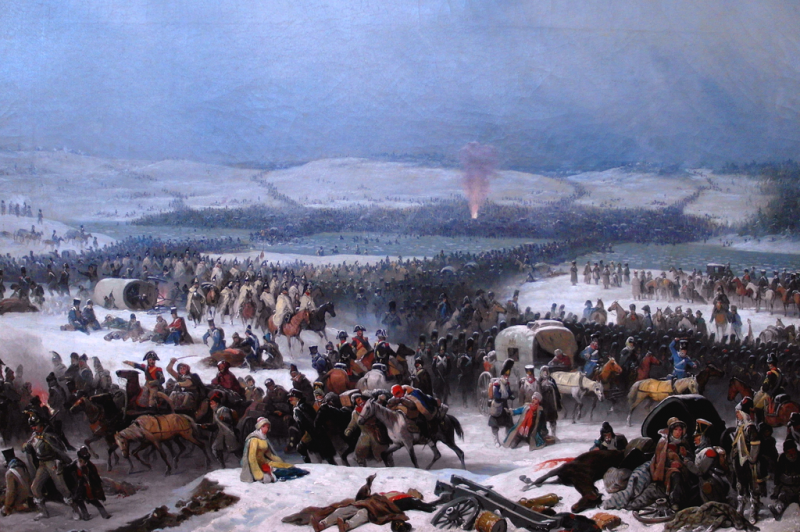
Crossing of Napoleon's troops across the Berezina. Hood. January Sukhodolsky (1859)
The death of the great army
The total losses of the French army for November 26-29 reached, according to various sources, from 35 to 50 thousand soldiers (according to other sources - 35 thousand people). Moreover, approximately 20 thousand were lost from among the combat-ready part of the army during the battles with the forces of Wittgenstein and Chichagov. Only the Russians captured 5 generals, 427 headquarters and chief officers, about 23,5 thousand soldiers as prisoners. In fact, during the battle on the Berezina, Napoleon's army ceased to exist. The Russian army lost 6-8 thousand people during this time.
However, due to the mistakes of the Russian command, the combination of circumstances and the halo of invincibility, because of which Chichagov and Wittgenstein feared a direct fight with Napoleon, the French avoided complete disaster. That is, the capture and surrender of the remnants of the army along with the emperor. Napoleon retained the color of his generals, officer corps and guards, which made it possible to create a new army in a short time and continue the war.
On the other hand, there is an opinion that this was the best outcome for this fight. By forcing Napoleon to give a decisive and last desperate battle, the Russians would have suffered serious losses. As a result of the battle at the Berezina, Napoleon's army actually ceased to exist anyway. Kutuzov solved the strategic task of eliminating the enemy army, with the expulsion of the enemy from the country, with small losses.
Information